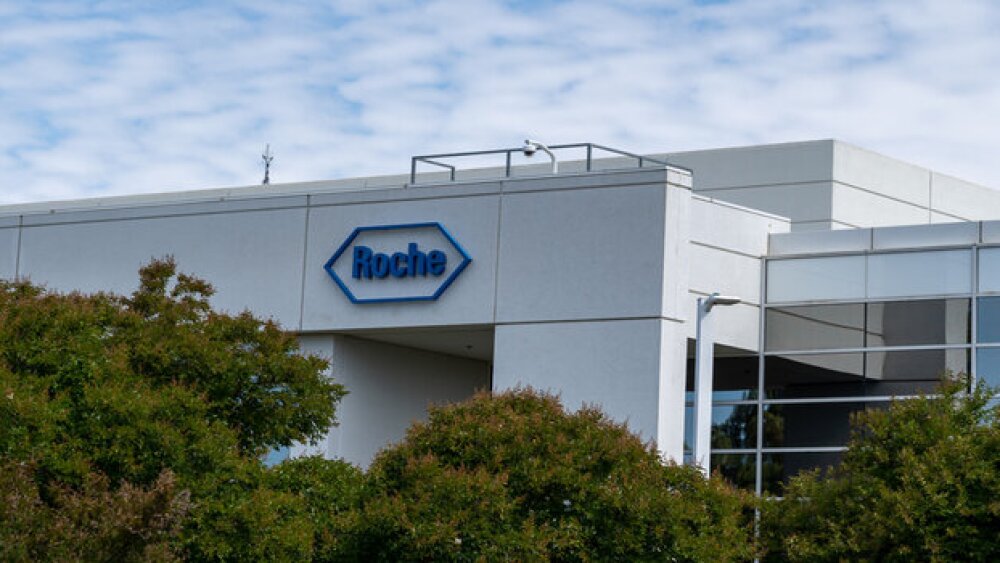Data suggests divarasib could be more potent than already approved KRAS inhibitors from Amgen and Mirati, but the study’s authors caution against cross-trial comparisons.
Pictured: Roche building in Pleasanton/iStock, JHVEPhoto
Roche’s Genentech on Thursday released early-stage data on its KRAS inhibitor, divarasib, as it hopes to join Amgen and Mirati in the potential blockbuster cancer market.
Phase I study results published in The New England Journal of Medicine showed divarasib as an oral monotherapy with durable response in patients with non-small cell lung cancer (NSCLC). Of the 60 NSCLC patients treated, over 53% had a confirmed response with a median progression-free survival (PFS) of 13.7 months. Response rate and PFS were slightly higher in the highest dose group, which is the dosing that will be used in future trials.
In the 55 colorectal cancer patients treated, 29.1% achieved a confirmed response with a median PFS of 5.6 months. Partial response was also observed in 36% patients with other solid tumor types.
Divarasib is a covalent KRAS G12C inhibitor. This class of drug is designed to bind to the P2 pocket of the cancer protein, trapping it in a state of inactivity.
Amgen was the first to get a KRAS inhibitor approved by the FDA in late May 2021. Lumakras (sotorasib) was greenlighted under the FDA’s accelerated approval program as a second line treatment for patients with locally advanced or metastatic NSCLC. In a Phase II study, patients on Lumakras saw a confirmed objective response rate (ORR) of 36% with a median PFS of 6.8 months.
About 18 months later, the FDA approved Mirati Therapeutics’ Krazati (adagrasib) for NSCLC with the G12C mutation in the KRAS gene. Krazati’s Phase II data was a little stronger than Lumakras with a 43% ORR and median PFS of 8.5 months.
While Roche’s Phase I data appear to be potentially stronger than the competition, the trial size was smaller and racial diversity limited. In addition, responses were assessed by investigators as opposed to blinded independent review, so superiority conclusions are as of now premature.
“[Divarasib] appears to show numerically more responses and longer progression-free survival among patients with either NSCLC or colorectal cancer than those observed with existing single-agent KRAS G12C inhibitors; however, conclusions drawn from cross-trial comparisons must be interpreted cautiously,” the study authors wrote.
In the Genentech-funded study, 93% of patients experienced treatment-related adverse events. Four patients discontinued treatment and 19 patients had their dosage reduced. Common side effects included nausea, diarrhea and vomiting. The safety profile appears to be similar to that of Krazati and Lumakras.
“It will be important to evaluate divarasib in larger randomized trials, as well as to evaluate it in combination with other promising agents,” Adrian Sacher, a principal author of the study told Healio News. “These studies are ongoing, and we look forward to their results.”
Kate Goodwin is a freelance life science writer based in Des Moines, Iowa. She can be reached at kate.goodwin@biospace.com and on LinkedIn.






